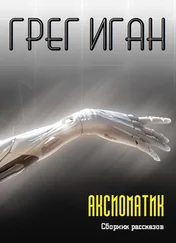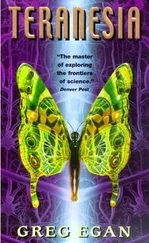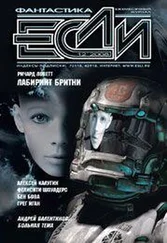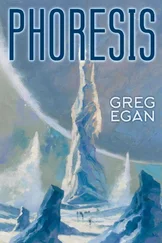Грег Иган - Permutation City
Здесь есть возможность читать онлайн «Грег Иган - Permutation City» весь текст электронной книги совершенно бесплатно (целиком полную версию без сокращений). В некоторых случаях можно слушать аудио, скачать через торрент в формате fb2 и присутствует краткое содержание. Жанр: Фантастика и фэнтези, Киберпанк, на английском языке. Описание произведения, (предисловие) а так же отзывы посетителей доступны на портале библиотеки ЛибКат.
- Название:Permutation City
- Автор:
- Жанр:
- Год:неизвестен
- ISBN:нет данных
- Рейтинг книги:4 / 5. Голосов: 1
-
Избранное:Добавить в избранное
- Отзывы:
-
Ваша оценка:
- 80
- 1
- 2
- 3
- 4
- 5
Permutation City: краткое содержание, описание и аннотация
Предлагаем к чтению аннотацию, описание, краткое содержание или предисловие (зависит от того, что написал сам автор книги «Permutation City»). Если вы не нашли необходимую информацию о книге — напишите в комментариях, мы постараемся отыскать её.
Permutation City — читать онлайн бесплатно полную книгу (весь текст) целиком
Ниже представлен текст книги, разбитый по страницам. Система сохранения места последней прочитанной страницы, позволяет с удобством читать онлайн бесплатно книгу «Permutation City», без необходимости каждый раз заново искать на чём Вы остановились. Поставьте закладку, и сможете в любой момент перейти на страницу, на которой закончили чтение.
Интервал:
Закладка:
His dizziness had passed, but he strode into the library and poured himself a drink from two cut-glass decanters, a bracing mixture of Confidence and Optimism. With a word, he could have summoned up a full mood-control panel -- an apparition which always reminded him of a recording studio's mixing desk -- and adjusted the parameters of his state of mind until he reached a point where he no longer wished to change the settings . . . but he'd become disenchanted with that nakedly technological metaphor. Mood-altering "drugs," here, could function with a precision, and a lack of side effects, which no real chemical could ever have achieved -- pharmacological accuracy was possible, but hardly mandatory -- and it felt more natural to gulp down a mouthful of "spirits" for fortification than it did to make adjustments via a hovering bank of sliding potentiometers.
Even if the end result was exactly the same.
Thomas sank into a chair as the drink started to take effect -- as a matter of choice, it worked gradually, a pleasant warmth diffusing out from his stomach before his brain itself was gently manipulated -- and began trying to make sense of his encounter with Paul Durham.
You have to let me show you exactly what you are.
There was a terminal beside the chair. He hit a button, and one of his personal assistants, Hans Löhr, appeared on the screen.
Thomas said casually, "Find out what you can about my visitor, will you?"
Löhr replied at once, "Yes, sir."
Thomas had six assistants, on duty in shifts around the clock. All flesh-and-blood humans -- but so thoroughly wired that they were able to switch their mental processes back and forth between normal speed and slowdown at will. Thomas kept them at a distance, communicating with them only by terminal; the distinction between a visitor "in the flesh" and a "mere image" on a screen didn't bear much scrutiny, but in practice it could still be rigorously enforced. He sometimes thought of his staff as working in Munich or Berlin . . . "far enough away" to "explain" the fact that he never met them in person, and yet "near enough" to make a kind of metaphorical sense of their ability to act as go-betweens with the outside world. He'd never bothered to find out where they really were, in case the facts contradicted this convenient mental image.
He sighed, and took another swig of C & O. It was a balancing act, a tightrope walk. A Copy could go insane, either way. Caring too much about the truth could lead to a pathological obsession with the infrastructure -- the algorithms and optical processors, the machinery of "deception" which lay beneath every surface. Caring too little, you could find yourself gradually surrendering to a complacent fantasy in which life had gone on as normal, and everything which contradicted the illusion of ordinary physical existence was avoided, or explained away.
Was that Durham's real intention? To drive him mad?
Thomas had ordered the usual cursory screening before letting Durham in, revealing only that the man worked as a salesman for Gryphon Financial Products -- a moderately successful Anglo-Australian company -- and that he possessed no criminal record. Elaborate precautions were hardly warranted; visitors could do no harm. Thomas's VR consultants had assured him that nothing short of tampering with the hardware in situ could ever damage or corrupt the system; no mere signal coming down the fiber from the outside world could penetrate the protected layers of the software. Visitors who wreaked havoc, introducing viruses by the fiendishly clever binary-modulated snapping of their fingers, were the stuff of fiction. (Literally; Thomas had seen it happen once on The Unclear Family.)
Durham had said: "I'm not going to lie to you. I've spent time in a mental institution. Ten years. I suffered delusions. Bizarre, elaborate delusions. And I realize, now, that I was seriously ill. I can look back and understand that.
"But at the very same time, I can look back and remember what it was that I believed was happening when I was insane. And without for one moment ceasing to acknowledge my condition, I still find those memories so convincing . . . "
Thomas's skin crawled. He raised his glass . . . and then put it down. He knew that if he kept on drinking, nothing the man had said would unsettle him in the least -- but he hadn't drunk enough, yet, to be absolutely sure that that was what he wanted.
"If you're not prepared to perform the experiment yourself, at least think about the implications. Imagine that you've modified the way in which you're computed -- and imagine what the consequences would be. A gedanken experiment -- is that too much to ask for? In a sense, that's all I ever performed myself."
The terminal chimed. Thomas took the call. Löhr said, "I have a preliminary report on Paul Durham. Would you like me to read it?"
Thomas shook his head. "I'll view the file."
He skimmed it, at level one detail. Paul Kingsley Durham. Born in Sydney on June 6, 2000. Parents: Elizabeth Anne Maddox and John Arthur Durham . . . joint owners of a delicatessen in the Sydney suburb of Concord, from 1996 to 2032 . . . retired to Mackay, Queensland . . . now both deceased by natural causes.
Educated at a government high school. 2017: Higher School Certificate aggregate score in third percentile; best subjects physics and mathematics. 2018: completed one year of a science degree at Sydney University, passed all examinations but discontinued studies. 2019 to 2023: traveled in Thailand, Burma, India, Nepal. 2024: on return to Australia, diagnosed with an organic delusional syndrome, probably congenital . . . condition partly controlled by medication. Numerous casual laboring jobs until May, 2029. Condition deteriorating . . . disability pension granted January, 2031. Committed to Psychiatric Ward of Blacktown Hospital on September 4, 2035.
Corrective nanosurgery to the hippocampus and prefrontal cerebral cortex performed on November 11, 2045 . . . declared a complete success.
Thomas switched to level two, to fill in the ten-year gap, but found little more than a long list of the drugs, neural grafts, and gene-therapy vectors which had been injected into Durham's skull during that period, to no apparent benefit. There were frequent notes that the treatments had been tested first on a set of partial brain models, but hadn't worked in practice. Thomas wondered if Durham had been told about this -- and wondered what the man imagined happened when a drug was evaluated on fifteen separate models of different regions of the brain, which, taken together, encompassed the entire organ . . .
2046 to 2048: studying finance and administration at Macquarie University. 2049: graduated with first class honors, and immediately hired by Gryphon as a trainee salesman. As of January 17, 2050, working in the Artificial Intelligence Division.
Which meant selling protection, in various guises, to Copies who were afraid that their assets were going to be pulled out from under them. Durham's job description would certainly cover spending long hours as a visitor -- if not quite stretching to matters like disclosing details of his personal psychiatric history, or suggesting metaphysical gedanken experiments to his clients. Or indeed, wasting time on Copies obviously far too secure to need Gryphon's services.
Thomas leaned back from the terminal. It was almost too simple: Durham had fooled his doctors into believing that they'd cured him -- and then, with typical paranoid ingenuity and tenacity, he'd set about getting himself into a position where he could meet Copies, share the Great Truth that had been revealed to him . . . and try to extract a little money in the process.
If Thomas contacted Gryphon and told them what their mad salesman was up to, Durham would certainly lose his job, probably end up in an institution again -- and hopefully benefit from a second attempt at nanosurgery. Durham probably wasn't harming anybody . . . but ensuring that he received treatment was, surely, the kindest thing to do.
Читать дальшеИнтервал:
Закладка:
Похожие книги на «Permutation City»
Представляем Вашему вниманию похожие книги на «Permutation City» списком для выбора. Мы отобрали схожую по названию и смыслу литературу в надежде предоставить читателям больше вариантов отыскать новые, интересные, ещё непрочитанные произведения.
Обсуждение, отзывы о книге «Permutation City» и просто собственные мнения читателей. Оставьте ваши комментарии, напишите, что Вы думаете о произведении, его смысле или главных героях. Укажите что конкретно понравилось, а что нет, и почему Вы так считаете.









![Грег Иган - Рассказы [компиляция]](/books/419837/greg-igan-rasskazy-kompilyaciya-thumb.webp)
